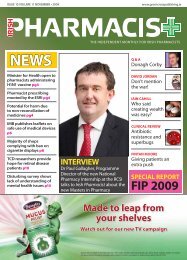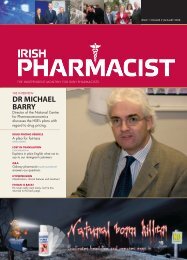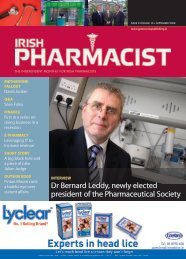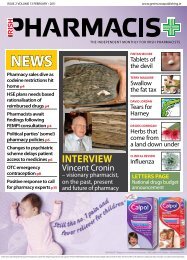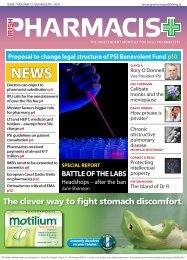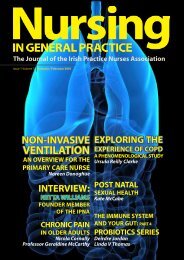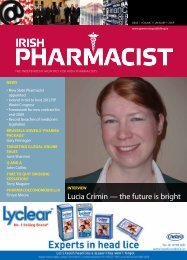Pharmacy Assistant - Green Cross Publishing
Pharmacy Assistant - Green Cross Publishing
Pharmacy Assistant - Green Cross Publishing
You also want an ePaper? Increase the reach of your titles
YUMPU automatically turns print PDFs into web optimized ePapers that Google loves.
• Bedroom windows should be kept closed in the morning<br />
and evening as these are times when the pollen count is<br />
particularly high.<br />
• Bed clothes should be washed regularly in very hot water;<br />
a mattress protector should be used and the mattress<br />
vaccumed on a regular basis.<br />
• For those who have to venture out, it can sometimes help to<br />
put some Vaseline around the inside of the nose.<br />
• Wrap-around sunglasses will help prevent pollen attacking<br />
the eyes.<br />
• Car windows should be kept closed.<br />
• Keep away from parks and open fields, again particularly in<br />
the early evening.<br />
• Avoid putting out washing when the pollen count is high.<br />
• When planning a garden, try and choose low risk plants.<br />
• Before venturing into the garden sprinkle it with a fine spray<br />
of water in order to dampen down air pollen.<br />
• It seems obvious but at all costs avoid cutting the grass!<br />
• Animals often pick up pollen when they are outside so it is<br />
worth rubbing them down with a damp towel when they reenter<br />
the house.<br />
• On fine days head for the seaside for some guaranteed relief.<br />
TreATmenT<br />
In recent years the medicines available have not just become<br />
more effective but also have less side effects.<br />
Anti-histamines - anti-histamines and nasal sprays are the<br />
first line of attack. Unlike the old anti-histamines, the newer<br />
generation do not cause drowsiness. Anti-histamines are<br />
relatively cheap and start working within a few hours. They inhibit<br />
the effect of histamines, which are released on foot of an allergic<br />
reaction – it is the histamines release that causes the symptoms<br />
of hay fever. They will relieve sneezing, a runny nose, watery eyes,<br />
and itchy ears and palate.<br />
Steroids - these are very effective in treating nasal symptoms.<br />
They suppress the allergic response in the first place and help<br />
reduce inflammation. Where possible they should be started at<br />
least seven days prior to the start of the hay fever season. They<br />
are very effective when combined with an anti-histamine in the<br />
first week.<br />
Nasal decongestants - these are effective for mild symptoms.<br />
They should be used only in the short term, three to five days at<br />
most, as overuse can cause rebound and so ultimately make the<br />
problem worse. That said, a short sharp dose will help unblock<br />
the nose.<br />
Sodium cromoglycate (nose spray or eye drops) - this is<br />
effective in relieving mild to moderate symptoms but less so<br />
in treating more severe attacks. Treatment should be initiated<br />
before the onset of the pollen season. It is useful in treating<br />
children.<br />
De-sensitisation treatment or immunotherapy - in cases of<br />
severe, long-term hay fever, immunotherapy or desensitisation<br />
treatment may be an option. An allergy specialist will gradually<br />
introduce small amounts of the substance that the patient is<br />
allergic to. A small amount of an allergen such as pollen or a fungi<br />
is injected into the body and the allergic reaction is monitored.<br />
Alternative therapies - There is anecdotal evidence that some<br />
herbal remedies, homeopathy and acupuncture may help relieve<br />
or prevent hay fever symptoms, but there is little scientific<br />
research to back this up.



